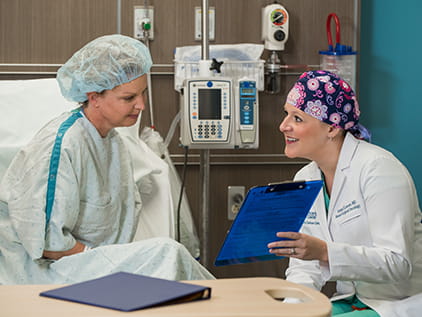Colonoscopy
A colonoscopy is a test that’s used to screen for changes or abnormalities in the colon (large intestine), including colon cancer. Polyps (clumps of cells) or abnormal tissue can be removed during a colonoscopy, or tissue samples taken for additional testing.
As part of an academic medical center connected to ongoing research, The University of Kansas Health System offers the latest options for colorectal screenings. Through clinical trials, our patients are often among the first to benefit from treatment advances as they are developing.
What is a colonoscopy?
A colonoscopy is a procedure performed by a doctor to detect abnormalities or changes in the colon and rectum. During a colonoscopy, the doctor inserts a flexible tube with a lighted tip into the rectum. This allows the doctor to see inside the colon. If polyps or other types of abnormal tissue are present, the doctor removes them with the scope. The tissue sample, or biopsy, is then examined by a pathologist for the presence of cancer cells.
You may have options on the type of colorectal screening available to you. Talk with your doctor to learn more. Additional screening options include:
We offer a variety of appointment types. Learn more or call 913-588-1227 to schedule now.
Who can have a colonoscopy?
Gastroenterology specialists recommend colon cancer screening for anyone age 45 and older who is at average risk of developing colorectal cancer. For individuals at normal risk, colonoscopy is typically recommended every 10 years.
Your physician may recommend you have a colonoscopy more frequently for:
- A change in your bowel habits, such as diarrhea, constipation or a feeling that your bowels are not emptying completely
- Blood in your stool or very dark, tarry-looking stools
- Chronic abdominal pain
What does a colonoscopy diagnose?
If your colorectal screening is positive, it means the doctor found polyps or abnormal tissue in your colon. While most polyps are not cancerous, some are. All tissue abnormalities are examined by a pathologist. Depending on the size and number of polyps discovered, your doctor may recommend more frequent colonoscopies in the future.
What are the risks of colonoscopy?
Some people may be more likely to develop colorectal cancer, so talk to your doctor about what type of colorectal screening is right for you. Even people with lower risk for colorectal cancer should be screened regularly. You should also know the risk factors for colon cancer:
- African-American or Jewish with Eastern European descent
- Age 45 or over
- Being overweight
- Drinking more than 2 alcoholic drinks a day
- Eating a diet high in red meat
- Family history of colorectal cancer
- Inflammatory bowel disease
- Inherited syndromes, such as Lynch syndrome, that are linked to colorectal cancer
- Lack of exercise
- Personal history of adenomatous polyps in the colon or previous colorectal cancer diagnosis
- Smoking
If you're age 45 or over, talk to your doctor about whether a colonoscopy is right for you.
Before your colonoscopy
To prepare for your colonoscopy, follow the directions provided by your doctor to ensure your rectum and colon are empty prior to the procedure. This may involve:
- Adjusting your medications: talk to your doctor about your current medications before your exam
- Drinking only clear liquids the day prior to your exam: water, coffee, tea or broth
- Taking a laxative: either pill or liquid form, as your doctor prescribes
- Using an enema: you may be advised to use an enema kit the night before or day of your exam
What to expect during your colonoscopy
A colonoscopy takes 30-60 minutes and you will be sedated. During this time, you will lie on your side with your knees drawn upward. The doctor will insert a colonoscope, which has a lighted tip, into your rectum. The doctor may also use air to inflate your colon to allow better viewing of the colon's lining.
The colonoscope extends the entire length of your colon. If a polyp or other abnormal tissue is discovered, the doctor can remove it for biopsy through the colonoscope.
Recovery and results for a colonoscopy
You may need about an hour to initially recover from the sedative used during your colonoscopy. Someone will need to drive you home, as it takes about a full day for the effects of the sedative to subside. During this time, you shouldn't return to work or make any important decisions.
You may feel some mild bloating for a few hours after your screening. There may also be some bleeding with your first bowel movement after your colorectal screening, but this is not typically cause for concern. If the bleeding or bloating persists for more than a few days, contact your doctor.
If there are no polyps or tissue abnormalities in your colon, your colorectal screening is negative. With a negative result, your doctor may recommend you have your next colonoscopy in:
- 1 year, if your exam was incomplete because of residual stool
- 5 years, if you have a history of polyps
- 10 years, if you are at average risk of colon cancer
For a colonoscopy that comes back positive for polyps or abnormal tissue, your doctor will discuss the best next steps to take, including additional testing.




Cancer care you can count on
The University of Kansas Cancer Center is 1 of fewer than 60 NCI-designated comprehensive cancer centers in the nation, and it's part of The University of Kansas Health System.




